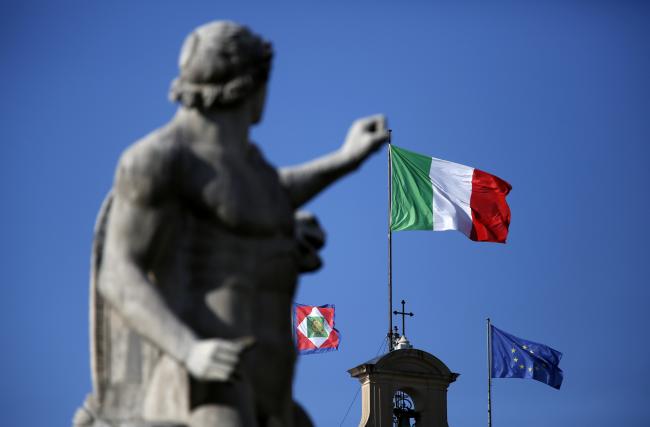 © Bloomberg. The national flag of Italy, center, and the European Union (EU) flag, right, fly from the Quirinale palace, the office of Italy’s president, in Rome, Italy, on Friday, Feb. 21, 2014. Photographer: Alessia Pierdomenico/Bloomberg
© Bloomberg. The national flag of Italy, center, and the European Union (EU) flag, right, fly from the Quirinale palace, the office of Italy’s president, in Rome, Italy, on Friday, Feb. 21, 2014. Photographer: Alessia Pierdomenico/Bloomberg(Bloomberg) — Italy’s populist government will bow to European Union pressure and reduce its budget deficit targets for 2020 and 2021, reversing plans for wider gaps that had rattled markets, newspaper Corriere della Sera reported, citing a Cabinet meeting.
The government will stick with its plan for 2.4 percent for 2019, while reducing the targeted gap to 2.2 percent and 2 percent for the two successive years respectively, according to Corriere. The government had originally said it would aim for 2.4 percent for all three years.
Newspaper la Repubblica reported a similar change of position, a day after government officials had said they were determined to follow through on their original plans.
The euro snapped five days of losses, gaining as much as 0.4 percent to 1.1594 against the dollar after the report.
As recently as Tuesday deputy Prime Minister Luigi Di Maio had said the government would stick to its plan for a deficit ceiling of 2.4 percent of GDP through 2021 in order to fund election pledges to cut taxes, create a minimum income for the poor and effectively lower the retirement age.
Italy already has the region’s biggest nominal debt and its pledges to breach EU rules requiring deficit reduction have fueled fears of a renewed crisis and sent the country’s bond yields soaring. The spread between benchmark Italian and German bonds reached the highest in more than five years this week after the EU rebuffed Italy’s spending goals.
“There’s lots of political risks coming out of Italy,”said Justin Tyler, Sydney-based director and portfolio manager at fixed-income house, Daintree Capital. “Anyone who believes a populist government is all of a sudden going to be particularly responsible in a fiscal sense, has a misguided view. You’re going to continue to see volatility in the euro.”
Fusion Media or anyone involved with Fusion Media will not accept any liability for loss or damage as a result of reliance on the information including data, quotes, charts and buy/sell signals contained within this website. Please be fully informed regarding the risks and costs associated with trading the financial markets, it is one of the riskiest investment forms possible.
Source: Investing.com




























